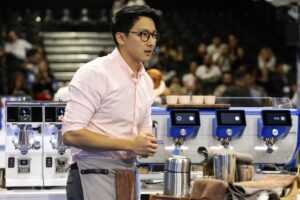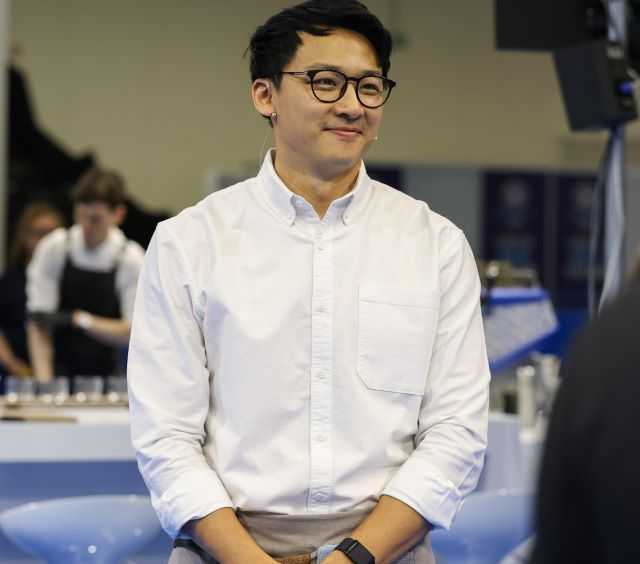Share your coffee stories with us by writing to info@comunicaffe.com.
MILAN – The third competition, four years of training, a family business, Um Coffee based in Brazil, producers, roasters and coffee shops specializing in specialty coffees all together: this is what’s behind the world barista champion 2023 Boram Um. Who told us about his adventure to win the world championship, joined by the other family talent, his older brother Garam Victor, Um who placed third for the brewers category. In short, when they say good blood doesn’t lie.
Boram Um, first icebreaker question: what is it like to be the world’s best barista?
“The good thing is that the previous champions were super nice to talk about how their experiences went and how was for them after they won worlds. Now I have a little better idea of what to expect in the next few months, I’m going to travel a lot and I’m going to work in many different countries. It’s a bit intimidating to be traveling so much, but it will be a good opportunity and experience. I’m pretty excited and a little bit prepared. “
But you knew that you were going to win the first place or being at least among the 6 finalists?
“No, I think it’s hard to predict. So many things could happen during competition. Even small mistakes can run you out of the 6 finalists. It’s very difficult to predict the result. We knew that we could do well, we had a very strong presentation, very good coffees, we had experience, we’ve been competing for 3 years at worlds. We had good expectations, but it’s still very surprising.”
Tell us a little about your journey as a professional that led you all the way to the top of the bartending championship?
“My family background’s South Korean they moved to Brazil a long time ago and my father started producing coffee about 20 years ago. Since we’re not traditional coffee producers in Brazil, we started to innovate, to make new things and I began working with coffee because of the farm. I used and still do quality control for the farm, doing the export side. I began working as a barista then, because back in 2016 we decided to open our coffee shop in Brazil.
For the last 7 years, we’ve been opening a few coffee shops and we’ve been working with roasting. All this experience amounted to what I’m now as a coffee professional. We have a quite unique view in terms of what coffee could be and what could influence the quality of coffee: this is what I’m happy to share at the world stage.
Definitely, it was a part of my speech. I think these unique qualities as a barista and as working in competition, give me access to visit a lot of other producers and learn a lot of different techniques that happen around the world. That inspired me to apply different processes and techniques to coffee that we produced on our farm, and that’s how we presented our Pink Bourbon on the world stage this year.”
What machine did you use for training? And were there any companies that most supported you to prepare and participate?
“I’ve trained on many different machines, but we have La Marzocco here and we use it to train. We had to use a Malkhoenig E65 as a grinder. It’s mainly our coffee company that provides the most support. Me and my brothers are partners in the company. It has been mainly our investment in terms of competing.”
But how much is important to compete?
“I think that is really important for us to compete. Especially knowing that Brazil is such a huge producing and consuming country. That is the first step for us to start changing how people consume coffee. Bringing this kind of result to Brazil highlights Brazil as a new market for many companies: they are starting to look at Brazil differently in terms of high coffee quality.”
Now instead, let’s get down to the details of his world competition: what coffee did he bring, how did he decline it in the various preparations, what story did he present on the platform?
“We used two coffees: a Geisha from Panama, which was my inspiration – seeing how this amazing coffee was processed and learning these new techniques makes me really want to apply that to the coffee that we’re producing in our farms -. So we use it on the Pink Bourbon that we produce on our farm. This coffee was prepared by us, then roasted and then I was happy to prepare it at the world stage.
For espresso I served a 100% of Geisha, then for milk, I did a blend (30% of Pink Bourbon and 70% Geisha), and for the signature again 100% of the Pink Bourbon. I decided to make it that way because I thought that it would be a nice progression: for espresso, this was my goal, I want to be able to produce this high-quality espresso; in the milk, I want to explain that we achieved that goal and we’re going to present the synergy between 2 different terroirs, Brazilian and Panamanian coffee. For the signature, I wanted to elevate our coffee and that’s why I used Pink Bourbon only in the end.

For the signature, we prepared 4 ingredients. I was looking for a very refreshing drink: I prepared a syrup of cherry, peach, and lime. Basically, fruits with sugar and water fermented a little bit. Then I prepared a coffee oil sacrum: after you pour espresso you got a coffee used puck and we extract the oil from that.
So I put sugar, the coffee puck, and water mixed in the paper filter and I extract all the oil and it becomes a coffee syrup. We created it as a team. We also prepared chytrid infusion: hot water, lemon with lemon grass heated up for a long time and brings a lot of aromatic components. The last ingredient was orange juice to add and to create our composition.
The coffee oil sacrum really helps to increase the coffee flavors of the drink, especially because we used the same used coffee grounds to make it. This was the bonus: it’s a creative way of using coffee as an ingredient.”
What has been the most difficult part of preparing the competition?
“I think that all the process has its challenges: finding the right coffee and developing the right curve profiles. And often the answers only come when you’re at the championship because of the different temperatures, different ingredients, and different water: that affects a lot of what we’re trying to do. I think that what a competitor needs to think more about is mental health and how to prepare properly mentally for competition. It’s very stressful, a lot of things could go wrong.
The main difference this time for me it’s like that in the previous years when something went wrong it was very hard for me to fix: this time a lot of things went wrong, but since I was experienced and I had a very supportive team, it was easier to navigate the competition time. I was very happy and that made a lot of difference.”
Now that you are world champion, what would you like to accomplish?
“I want to expand our brand, expand high-quality Brazilian coffee in the world, and enjoy the experience of connecting with coffee all over the globe. I think it’s really nice that now after my winning, a lot of different competitors are coming for us looking for coffee to compete with. It’s very important to change the market perception. The more competitor we have choosing Brazilian coffees the more it will bring interesting results for Brazilian coffee.”
Can you tell me a little bit about the Brazilian coffee situation? Because it is usually used, especially in Italy, as a standard ingredient for blends. Instead the specialty or at any rate the very good coffees are also there

“I think that Brazil is very diverse as a country and in coffee qualities. Brazil s very well known for high-volume blends and more commercial coffees. But I think this is our opportunity to start showcasing more small producers, who really produce high coffees and bring higher demands for high-quality lots all over the world. Brazil we do a lot of volumes, but we’re composed of many micro and small producers: it’s almost 17% of coffee producers in Brazil are small farmers. Bringing more of that high quality into the globe will help them here as well.”
What are you doing in your own farm?
“We do a lot of different types of processing, like fermentation engine. We also collaborate a lot with our neighbors and small producers in terms of learning how to increase quality. Sometimes we help them to commercialize their coffee as well. To face climate change we definitely have been investing in shade growth techniques. One of the biggest solutions that we can do for coffee farming.
Our coffee is much more healthier and sustainable in the long term. We’re a small-to-medium size producer in Brazil, we produce about 5 thousand bags in a year. We sell our product all over the world, we export most of our coffee: to Korea, japan a lot, some parts of Europe (Northway), and a lot in North America. Of course, we are very excited about working closer with Asia especially because it’s a very growing market and also because Asian consumers are very excited about coffee. It’s a lot of fun to work with Asian companies for sure.”
And now, a few words to the other world talent in the family: Garam Um. Why did you decide to enter the brewers competition and not barista’s like your brother?
“Since I started working with coffee, I immediately thought it was fascinating how the variables affect the final beverage in brewing, since then I always wanted to explore more and gain more knowledge for the brewers competition. “
Was this your first time at the world championship?
“It was my second time competing at the world brewers cup, it’s always a process and great learning for each competition. I felt that this time was a little bit harder because there were a lot of changes in the rules for competitors and judges.”
Did you also bring coffee grown and roasted by your company?
“No, I’ve used coffees from Colombia (Laurina variety) and Panama (Gesha variety) and made a blend with them.”
From your point of view, getting to be among the world’s top brewing champions, what does it say about coffee in Brazil today?
“It’s a great scenario and very good for Brazil as a producing country because everyone outside of Brazil will look even more for quality coffee in the country and give more value to it.”















